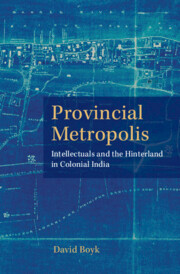Book contents
- Frontmatter
- Dedication
- Contents
- List of Figures and Maps
- Acknowledgments
- List of Abbreviations
- Note on Transliteration and Translation
- Introduction: Provinciality in Colonial India
- 1 A Length without Breadth
- 2 As Though in a Shrine
- 3 Collaborative Wit
- 4 A Sturdy Loyal People
- 5 Patna Capitalized
- Epilogue
- Glossary
- Bibliography
- Index
2 - As Though in a Shrine
Published online by Cambridge University Press: 25 September 2025
- Frontmatter
- Dedication
- Contents
- List of Figures and Maps
- Acknowledgments
- List of Abbreviations
- Note on Transliteration and Translation
- Introduction: Provinciality in Colonial India
- 1 A Length without Breadth
- 2 As Though in a Shrine
- 3 Collaborative Wit
- 4 A Sturdy Loyal People
- 5 Patna Capitalized
- Epilogue
- Glossary
- Bibliography
- Index
Summary
Historians of South Asia have their own global pilgrimage circuit. The stations vary by research topic, but itineraries often focus on collections built by the colonial state and maintained by its successors, among them the National Archives of India in Delhi, the National Library in Kolkata, and the British Library in London. Many have noted the perverse fact that the last of these—easily the world's richest collection of South Asian texts from both the colonial and precolonial eras—is located thousands of miles (and tens of thousands of rupees) away from the subcontinent, out of reach for most scholars from the region. Meanwhile, Germany, which had no colonial presence in South Asia, possesses major collections of Indian manuscripts, and American institutions hold immense troves of printed materials.
Anyone looking for the Mughal libraries or those of states like Avadh and Mysore will be disappointed. The great collections of precolonial South Asia were looted and scattered during the nineteenth century and, in some cases, carted off wholesale to Europe.3 Apart from some belonging to religious establishments, most of the region's libraries date to the late colonial and postcolonial periods. Many boast excellent collections of printed books, often maintained on a shoestring by hard-working staffs. Two libraries stand out, however, for their rich collections of Arabic and Persian manuscripts. These are the Raza Library in Rampur, the former capital of a small princely state, and the Khuda Bakhsh Oriental Public Library in Patna.
Information
- Type
- Chapter
- Information
- Provincial MetropolisIntellectuals and the Hinterland in Colonial India, pp. 72 - 118Publisher: Cambridge University PressPrint publication year: 2025
